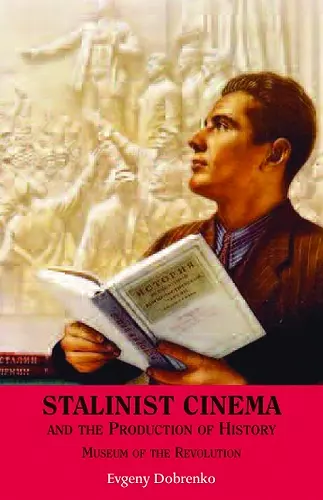Stalinist Cinema and the Production of History
Museum of the Revolution
Format:Hardback
Publisher:Edinburgh University Press
Published:5th Mar '08
Currently unavailable, and unfortunately no date known when it will be back

This book explores how Soviet film worked with time, the past, and memory. It looks at Stalinist cinema and its role in the production of history, the conversion of the present and experience into history, mechanisms of transfer, and what is located between history and the past. The representation of history is always the representation of power. The institution of legitimization and the mechanism for the production of identity, history is the past, constructed and served by the authorities who are attempting to curtail the experience by packaging it into a literary narrative and new visual imagery. Cinema's role in the legitimization of Stalinism and the production of a new Soviet identity was enormous. Both Lenin and Stalin saw in this 'most important of arts' the most effective form of propaganda and 'organisation of the masses'. By examining the works of the greatest Soviet filmmakers of the Stalin era -- Sergei Eisenstein, Vsevolod Pudovkin, Grigorii Kozintsev, Leonid Trauberg, Fridrikh Ermler, Mark Donskoi, Mikhail Romm -- the author explores the role of the cinema in the formation of the Soviet political imagination.Key Features *The first study of Stalinist cinema, which fills a gap in the history of Soviet film. *Covers the works of great Soviet film directors. *Focuses on Stalinist political imagination, one of the most understudied aspects of Stalinism.
This is a major study of the place of Soviet film within the Soviet cultural system. Specialists in the history of Russian film and culture will find it an indispensable resource. -- Professor Jeff Brooks, The Johns Hopkins University This is essential reading for all those interested in Soviet film. Dobrenko with his fresh approach and non-standard mix of examples confounds many of the cliches about the subject. -- Professor Katerina Clark, Yale University Professor Dobrenko's absorbing new study of Stalin period cinema shows how films set in the past, from historical epics to versions of literary classics to narratives of the Revolutionary struggle were required to adapt 'history' to the evolving political demands of the present. Witty and nuanced, drawing on a broad range of sources, the book combines unprecedented attention to hitherto neglected films with exciting new insights into classics of Soviet cinema. -- Professor Julian Graffy, University College London Each chapter provides attentive discussions of three or four films, weaving a convincing argument through powerful examples! Anglophone academics will find this book a useful gateway to Russian language sources on film and Stalinist art! Dobrenko has set an example of interpretive practice with this detailed, painstaking exploration of the interface between ideology and cinema. -- Maria Antonia Velez-Serna, University of Glasgow Kelvingrove Review The key to this book's success is precisely the way in which the author manages to combine and weave the many threads in his argument into a satisfying whole... In sum, this is a rigorous and engrossing work that brings a profound understanding to the films of the Stalinist era and will initiate debates on major films that, to date, have been largely ignored in cinematic history. -- Jamie Miller, University of Toronto Modern Language Review This is a major study of the place of Soviet film within the Soviet cultural system. Specialists in the history of Russian film and culture will find it an indispensable resource. This is essential reading for all those interested in Soviet film. Dobrenko with his fresh approach and non-standard mix of examples confounds many of the cliches about the subject. Professor Dobrenko's absorbing new study of Stalin period cinema shows how films set in the past, from historical epics to versions of literary classics to narratives of the Revolutionary struggle were required to adapt 'history' to the evolving political demands of the present. Witty and nuanced, drawing on a broad range of sources, the book combines unprecedented attention to hitherto neglected films with exciting new insights into classics of Soviet cinema. Each chapter provides attentive discussions of three or four films, weaving a convincing argument through powerful examples! Anglophone academics will find this book a useful gateway to Russian language sources on film and Stalinist art! Dobrenko has set an example of interpretive practice with this detailed, painstaking exploration of the interface between ideology and cinema. The key to this book's success is precisely the way in which the author manages to combine and weave the many threads in his argument into a satisfying whole... In sum, this is a rigorous and engrossing work that brings a profound understanding to the films of the Stalinist era and will initiate debates on major films that, to date, have been largely ignored in cinematic history.
ISBN: 9780748634453
Dimensions: unknown
Weight: unknown
320 pages